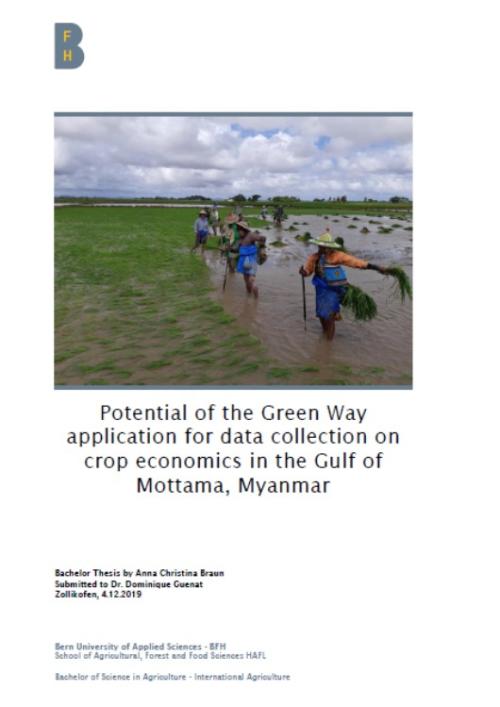This Bachelor Thesis addresses the potential of the Green Way mobile application (app) to record economic data on crop production from farmers in the Gulf of Mottama, Myanmar. The paper aims first at identifying farmers’ topics of highest interest and the main sources of information used. Second, the potentials and challenges of the Green Way app for data collection are summarized. The third aim is to study farmers’ willingness to share and record economic data. Fourth, a Cost-Benefit Analysis (CBA) on the Gulf of Mottama Project (GoMP) conducted in 2018, is updated with economic data from a household survey. A comparison of economic performance indicators of trained and non-trained farmers was conducted. Trained farmers were educated on how to record data with Green Way app, whereas non-trained farmers did not receive any direct training. The survey as well as key informant interviews and focus group discussions were carried out between May and October 2019 in Bilin and Kyaikhto Townships, Mon State. Literature, amongst others on crop economics, the use of smartphones and applications, provides important background information.
Farmers in the area are interested in cropping techniques, weather conditions, market prices, fertilizer and its application, seeds and its prices as well as pests and diseases. Mass media, especially the TV and the radio, as well as personal communication with other farmers or neighbours and extension services are the most important sources used. The digital knowledge and use of smartphones and mobile applications for agricultural information is still relatively low. At the time of the survey, the Green Way app was known by 33% and used by 13% of all farmers. The app could be used as information source for several topics of interest mentioned above.
The farming record feature has been incorporated into the Green Way to simplify the collection of economic data on crop economics. Farmers can easily record data through this feature and therefore better manage their farming activities. As a challenge, this farming record feature requires precise recording of economic data by the farmers in order to achieve a good sample of data for calculations on crop economics, including CBA, within the GoMP. Farmers are generally willing to share economic data. They wish for training on the use of smartphones and advice on farming practices in exchange for their data. However, data privacy is an issue, which should be included in the policy of the app and trainings of GoMP also in regard to other apps and digitalisation in general.
Concerning the update of the CBA done in 2018, the biggest difference has been found regarding income from green gram production. However, the sample of farmers producing green gram was small, which indicates that further research is needed.
The economic indicators of trained and non-trained farmers are significantly different concerning yield and net-income in paddy production. As it is unclear which farmers will use the farming record and share their data in the future, additional research on the users and non-users of the farming record is needed at the end of 2020. Since the collected data may not be representative of the farmers in the area, additional ways of data collection need to be found.
There is a big potential in the use of mobile applications like Green Way for information sharing and data collection in the Gulf of Mottama. Regular recording of crop economics could bring many advantages for farmers, reaching from less barriers for certification (e.g. GAP, Sustaintable Rice Platform) to a better overview of production branches and therefore improved farm management. Withal, the recording of data needs to be monitored closely in order to develop the app and the recording in a farmer-friendly and effective way. Such a digital change requires time for adaptation to the new technologies and training in order to educate farmers on the purpose and benefits of data recording.
Published By:
Published Date:
